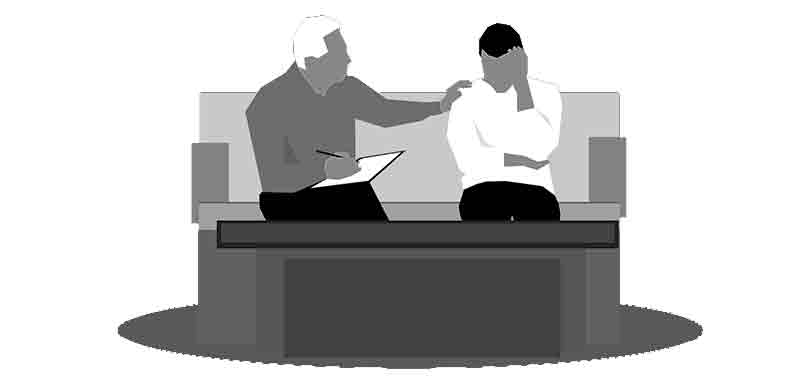Tips To Strengthen The Therapeutic Relationship: When you feel like you’re ‘stuck’ in therapy due to a lack of communication, it can be harder to continue with it. While it’s hard as a client, when you’re unable to communicate with your therapist, it’s equally frustrating as a therapist when you can’t get your client to open up to you. Your sessions seem to be victims of a notorious rut!
But before you use that as an excuse to save your cash and quit therapy, let’s see if we can find a way to move past these issues!

Inspiring your journey, one story at a time. #LifeFalcon.
The solution to strengthening the bond between a therapist and a client.
However, before discussing ways of how to get a client to open up in therapy, let’s take a look at what a therapeutic relationship is.
Table of Content
What is a therapeutic relationship and why is it important?

A therapeutic relationship is essentially a close interactive association of a trained, caring professional (such as a therapist) with their client. It is built upon trust, mutual respect, and liking for each other.
The major components behind good therapy reside in a client being able to trust and communicate with their psychiatrist.
The two go hand in hand, because it’s only when we trust someone, that we can learn to communicate with them (whether that’s through words or gestures); and without communication, therapy is wasteful and meaningless.
You should be comfortable enough to walk into your therapist’s office and say ‘I binged today’ or ‘I cut myself today’. Hence a very crucial part of making sure that your therapy sessions are beneficial is finding a therapist you feel comfortable around.
Why clients might find it hard to open up to therapists?

- Fear of being judged
Since the fear of being judged is engraved into most peoples’ minds from a very young age, it naturally resurfaces when it comes to therapy!
Clients might be afraid that their problems aren’t valid (or bad) enough.
Or they might be ashamed of repeating the same mistakes multiple times and being judged for it by their therapist as they might have been by those around them.
- Uncomfortable with their surroundings
Confiding in a friend about their troubles might seem less unnerving but when it comes to opening up to a stranger, the difficulty level goes up a notch. If a client is not comfortable in the presence of a particular therapist, they will not open up to them, period.
This is especially true for people who are forced into therapy. They are always on the lookout for any excuse to discontinue it! Instead of focusing on the work they need to be doing on themselves.
Such clients will divert their attention towards the ‘unsuitable room temperature’ or its claustrophobic feel, weird posters etc. ultimately becoming a hurdle when trying to strengthen the bond between a therapist and a client.
- Bad history with therapists
When a person has had unfortunate experiences with therapists in the past, they tend to be more guarded when it comes to opening up to new ones. Although this is completely normal and understandable, it often leaves them with little to no motivation to continue with therapy.
- History of repressed feelings
A fear of vulnerability plays a huge factor in this due to various reasons. Whether its countless men being told not to cry or people being told that their feelings aren’t valid. Constantly repressed emotions make it very hard for people to open up and be vulnerable in therapy.
Tips for a therapist – Make the client open up 
The bond between a therapist and client is formed through the maintenance of a therapeutic relationship- which is a long process that will take time and a combined effort from both sides.
A therapist must try their best to make their clients feel comfortable and respected in their office. On the other hand, the client needs to make an honest effort to cooperate with their therapist.
Here are a few tips for both clients and therapists to work on for more productive sessions:
-
Make them feel comfortable- your office should be a safe space for a client
Before a client can open up in therapy, you need to make sure that they feel safe and comfortable around you. While having a comfortable office space is important, it’s equally important for you to introduce yourself, in such a way that the client feels like they’re in good hands.
Feel free to decorate your office as you deem most inviting. But do stay away from controversial posters/ books/ signs, etc.
For your first meeting, start on a more informal note. Perhaps offer them a drink (coffee, tea or juices, etc), make small talk, or even crack a joke. If the client seems too hesitant about opening up, do let them know about your policies of confidentiality.
Mention that whatever is discussed in your session will stay between the two of you. Unless they threaten to harm someone or confess to being a child abuser.
-
Prepare your sessions beforehand and ask open-ended questions!

Once you have begun therapy with a client, go over notes from previous sessions. Prepare questions for your next session beforehand. This way you will have a clear idea of what you want to focus on in your session.
This will also make you seem more prepared which boost the client’s confidence in your abilities. Try and stick to more open-ended questions rather than yes or no ones. This gives the client a greater chance to elaborate on the events you want to discuss.
If that doesn’t help, then try the art of misinterpretation. This technique is usually used with newer clients who aren’t opening up because they simply don’t want to be there.
Try assuming what they are there for or some of their personality traits if they don’t tell you themselves. Although it is a tad bit risky, nothing gets people talking like wanting to correct a wrong fact about them.
-
Congruence- Be genuine in your reactions
The basis of trust in a therapeutic relationship stems from congruence which implies that a therapist needs to genuinely react to a client’s story.
This is a very important part of making a client feel like they’re being heard, acknowledged, and understood. You can’t just be a robot; i.e. sit, listen, nod, take some notes, offer words of encouragement, and then let them leave.
Feel free to express sympathy, pride, joy, and even frustration, but remember to not overshare. If an action by your client frustrates you, kindly let them know.
It’s equally important to not feign these reactions as people do catch on which disrupts the bond we’re trying to establish. People are sensitive and if they detect fake enthusiasm at their achievements they will feel mocked, humiliated, misunderstood, and most likely shut down.
-
Positive reinforcement
For people struggling with their mental health (such as depression), small accomplishments speak volumes. It is very important to make sure that you’re giving your clients positive reinforcement whenever possible.
Again, do not give false reinforcements. When your clients shows some progress, even if they are shy about expressing it, celebrate and let them know how proud you feel.
It’s always the smaller steps that matter! This will not only make your clients feel appreciated but will also encourage them to continue their journey.
-
Always keep the focus on the client

Remember, you are their therapist and not their friend. When you turn to friends and family for advice, most of the time they use their personal experience to relate with you before offering advice.
But when it comes to therapy, all of the focus should be solely on the client. While it’s okay to share your own experiences here and there, it should be very brief and only when necessary!
This also refers to keeping your feelings and personal problems at bay when it comes to a counseling session with your client. If you are having trouble at home or work, your client doesn’t need to hear about it. If you feel particularly anxious about a certain session, that is okay! But you need to get your nerves in order before your session.
This is crucial because when a client will sense that you are anxious, they will start doubting your abilities. This lead them to shut down instead of opening up more.
-
Unconditional positive regard- Be empathetic and refrain from judgment
The people walking through your doors for the first time could either be doing badly in school or suffering from suicidal thoughts after severe trauma or be rape and abuse survivors.
Regardless of their stories, you need to show unconditional positive regard for all of them- which means you need to be very empathetic and non-judgmental.
Instead of getting mad at them when they lash out, find the source of all of that frustration and anger. Retaliate with kind words, and more open-ended questions even if it is at your expense, as long as it gets them talking!
-
Know how much to coddle them!
As a therapist, you should know where to draw the line between pushing a client too far and coddling them. If you coddle them too much, they won’t ever get out of their comfort zones. You have to let them explore what makes them uncomfortable.
-
Focus on body language
You’re probably lucky if you get a chatty Cathy in your first meeting. However, that’s not always the case.
If your client isn’t too big on talking, focus on their body language instead. Ask questions, touch various topics, and see how they react.
They will usually tense up when you hit a nerve, which allows you to ask more follow up questions regarding that particular one.
-
Give homework!
Only an hour of therapy a week or every other day is not enough to see a real change in the client. Start giving your client homework, which can either be journaling or simply evaluating certain aspects of their lives.
It’s going to be unique for everyone but it should be something that reinforces the usage of techniques and coping mechanisms you’re teaching them in therapy.
Tips for clients: How they can stay relaxed

-
Have a genuine desire to work on yourself
As the saying goes, you can only help someone who wants to be helped. So if you, as a client offer nothing but resistance to your therapist, you probably won’t get much done. This is because you’re not actively trying to work through your trauma.
No one’s asking you to have a completely positive outlook regarding it but as long as you show your therapist that you’re willing, they will guide you from thereon.
-
Be very clear about your goals
Once you have met your therapist, in your first session you need to be very clear about your goals in therapy. Let them know where your problems lie and what issues you want to work on.
This will not only help your therapist plan your future sessions accordingly. But also give you the motivation of an ‘end goal’ to work towards.
-
Be completely honest
Therapy will get you nowhere if you aren’t honest about your past, your experiences, your trauma, your slip-ups, etc. Therapists can usually tell when a client is lying and will find other ways of seeking out your truth. Thus, save them the trouble and tell them. Just remember, they won’t judge you as they are only there to help you!
-
Know your expectations from therapy
You cannot expect a therapist to give you a clear answer to all your problems. Whether you should divorce your wife or not, or take on that extra job or visit your troubled family for a holiday is not for your therapist to decide.
What they will do instead is ask you to weigh the pros and cons of wanting to do those things. The aim is to assess how they make you feel. By going off of that, and working through your issues, they’ll be able to guide you to decide by yourself. It is all about strengthening your mental well being.
-
Do your homework!
No, you’re not being graded on it but it only works out in your favor. It helps to check in with your mental health once in a while. And do whatever’s necessary to make sure it doesn’t go downhill!
Remember that switching your therapist is always an option!
If you want to continue working with your current therapist and use the tips mentioned above to form a better relationship with them, then that’s fantastic.
But keep in mind that you do have the option of seeking help from someone else. Similarly, if as a therapist you don’t think that you are the right person to treat a certain patient, refer them to someone else.
The ultimate goal of therapy is to make sure that your mental health stays stable. Even if it takes some time to find the perfect person to help you with that, it is alright!



















